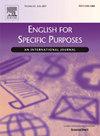Towards LLM-assisted move annotation: Leveraging ChatGPT-4 to analyse the genre structure of CEO statements in corporate social responsibility reports
IF 2.7
1区 文学
Q1 LINGUISTICS
引用次数: 0
Abstract
Recent studies have explored the potential of large language models (LLMs) in annotating rhetorical moves in academic genres such as research article abstracts and research article introductions. Extending this line of research beyond academic contexts, this study investigates the feasibility of using ChatGPT-4 to automate move annotation in a professional genre: CEO statements from corporate social responsibility reports. The study proceeded in two phases. First, 30 CEO statements were used for move identification, prompt design and validation, resulting in a prompt optimized for the move annotation task. Subsequently, a corpus of 50 CEO statements was used to further test the efficacy of the model conditioned by the established prompt. The assessment showed that the model's annotation outputs yielded an accuracy of 87.14 %. However, the double annotation rounds revealed an intra-model inconsistency rate of 32.87 %, indicating the need for human verification in inconsistent cases. This study demonstrates that LLMs can effectively support the development of move-annotated corpora through reduced workload and enhanced methodological duplicability. These annotated corpora serve as valuable pedagogical materials for ESP practitioners in genre-based instruction. Furthermore, the integration of LLMs can aid in improving researchers' own thinking, thereby contributing to potential theory refinement in the field.
走向llm辅助动作注释:利用ChatGPT-4分析企业社会责任报告中CEO陈述的体裁结构
最近的研究探索了大型语言模型(llm)在注释学术类型(如研究文章摘要和研究文章介绍)中的修辞动作方面的潜力。将这一研究延伸到学术背景之外,本研究探讨了使用ChatGPT-4在专业类型中自动移动注释的可行性:来自企业社会责任报告的首席执行官声明。这项研究分两个阶段进行。首先,使用30个CEO语句进行移动识别、提示设计和验证,得到针对移动注释任务优化的提示。随后,使用50个首席执行官陈述的语料库来进一步测试该模型在既定提示条件下的有效性。评估表明,该模型的注释输出的准确率为87.14%。然而,双注释轮显示模型内不一致率为32.87%,表明在不一致的情况下需要人工验证。本研究表明,llm可以通过减少工作量和增强方法的可重复性,有效地支持移动注释语料库的开发。这些带注释的语料库在基于体裁的教学中为ESP从业者提供了有价值的教学材料。此外,法学硕士的整合可以帮助提高研究人员自己的思维,从而有助于该领域潜在的理论完善。
本文章由计算机程序翻译,如有差异,请以英文原文为准。
求助全文
约1分钟内获得全文
求助全文
来源期刊

English for Specific Purposes
LINGUISTICS-
CiteScore
5.70
自引率
8.00%
发文量
41
审稿时长
62 days
期刊介绍:
English For Specific Purposes is an international peer-reviewed journal that welcomes submissions from across the world. Authors are encouraged to submit articles and research/discussion notes on topics relevant to the teaching and learning of discourse for specific communities: academic, occupational, or otherwise specialized. Topics such as the following may be treated from the perspective of English for specific purposes: second language acquisition in specialized contexts, needs assessment, curriculum development and evaluation, materials preparation, discourse analysis, descriptions of specialized varieties of English.
 求助内容:
求助内容: 应助结果提醒方式:
应助结果提醒方式:


